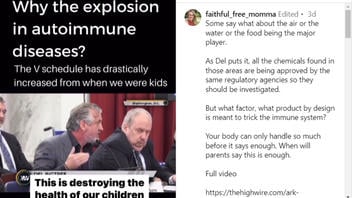
Did vaccines cause an "explosion in autoimmune diseases"? No, that's not true: Only in rare cases has vaccination been associated with autoimmune diseases. Vaccines are rigorously tested for safety before being approved for use, and extensive research has shown that vaccines are not linked to an "explosion of autoimmune diseases."
The claim appeared in a post and video (archived here) on Instagram by faithful_free_momma on March 8, 2024, under the on-screen title "Why the explosion in autoimmune diseases?" The post's caption said:
Some say what about the air or the water or the food being the major player.
As Del puts it, all the chemicals found in those areas are being approved by the same regulatory agencies so they should be investigated.
But what factor, what product by design is meant to trick the immune system?
Your body can only handle so much before it says enough. When will parents say this is enough. ...
#notmychild #safety #children #disease #infection
This is what the post looked like on Instagram at the time of writing:
(Source: Instagram screenshot taken on Fri Mar 8 16:46:55 2024 UTC)
The video
During the 28-second clip, Del Bigtree, founder of the anti-vaccine group Informed Consent Action Network (ICAN), makes his case that vaccines are hurting human immune systems. He said:
This is one product that, by design, is designed to trick your immune system into thinking it's had a disease. And we're not tricking it one time, or two times, or five times, or 10 times, or 20 times, or 50 times. Seventy-two times. No one in this room has been through that. Not one of these adults.
We say, 'Oh, I'm doing the same thing to my kids that I did.' No, you're not. This is destroying the health of our children. We need to get on top of it the right way.
The video provides no evidence to support the claim that vaccines are damaging the body's natural defense system and creating an "explosion in autoimmune diseases."
Autoimmune diseases
The human body has a defense system composed of organs and cells that defend against bacteria, parasites, viruses and cancer cells. However, in autoimmune diseases, this system mistakenly attacks the body instead of protecting it. The reason for this is not clear.
There are over 100 known autoimmune diseases, with common ones including lupus, rheumatoid arthritis, Crohn's disease and ulcerative colitis. These diseases can affect various tissues and almost any organ, leading to symptoms like pain, fatigue, rashes, nausea, headaches, dizziness and more. The exact symptoms depend on the specific disease.
Response to claim: Cleveland Clinic
In a March 12, 2024, email to Lead Stories, Katrina Healy, senior corporate communications manager for the Cleveland Clinic, provided the hospital's response to the claim made in the social media post. The response said:
Vaccines have been critically important in controlling and eradicating serious infections. Except for rare associations, the role of vaccines in the development of autoimmune diseases has not been established.
Articles and data published in the National Library of Medicine support the notion that a correlation between vaccination and autoimmune diseases is not typical:
- Vaccinations and Autoimmune Diseases
- Vaccination and Induction of Autoimmune Diseases
- The state of vaccine safety science: systematic reviews of the evidence
The first of the three articles said this in its "Conclusions" section:
Autoimmune diseases have a complex multifactorial etiology [set of causes] and many factors can contribute to their onset. For this reason, vaccines have also been studied and monitored over time in order to evaluate a possible link between vaccination and the onset of autoimmune diseases or immune-mediated phenomena. However, a causal link between vaccination and AEFI [adverse event following immunization] has been ascertained only for a few cases; moreover, AEFI are significantly lower after vaccination than those produced by infection with the wild microorganism, thus confirming the high safety profile of vaccines.
Response to claim: Food and Drug Administration
Cherie Duvall-Jones, a press officer at the Food and Drug Administration (FDA), provided the agency's response to the claim on Instagram. A March 13, 2024, email said: "safety surveillance systems have not identified an increase in autoimmune disease caused by vaccination." The statement continued:
The information within this social media post is representative of the ongoing proliferation of misinformation and disinformation about the overall safety of vaccines which results in vaccine hesitancy and lowers vaccine uptake.
Vaccines are one of the most highly effective public health interventions, responsible for saving millions of lives each year. In the U.S., vaccines must be manufactured with high quality, and their safety and effectiveness must be demonstrated. Their safety over time is also closely and continuously monitored through multiple overlapping passive and active safety surveillance systems. These overlapping systems, together with the demonstration of safety in clinical trials required for vaccine approval in the U.S., have established an excellent and well-tolerated vaccine safety record.
Vaccine safety systems
Various safety surveillance systems, including the Vaccine Adverse Event Reporting System (VAERS), Vaccine Safety Datalink (VSD), Biologics Effectiveness and Safety (BEST) System and the Sentinel Initiative, are used by the FDA and Centers for Disease Control and Prevention (CDC) to monitor vaccine safety.
VAERS specifically aims to quickly identify unusual or unexpected patterns of adverse events. The FDA and CDC regularly analyze VAERS data, which may involve collecting follow-up medical information. If VAERS indicates a potential link between an adverse event and vaccination, further investigation, such as through VSD or BEST, may be conducted.
Response to claim: CDC
In a March 13, 2024, email to Lead Stories, Nick Spinelli, a public affairs specialist with the CDC, provided the public health agency's response. The CDC said:
Extensive research and safety monitoring has not established an association between vaccination and any autoimmune diseases with the following exceptions:
- Increases in the risk of Guillain-Barré syndrome (GBS) was causally associated with the 1976 swine flu vaccines at a rate of approximately one case of GBS for every 100,000 people who received the swine flu vaccination.
- The association between a potential increased risk of GBS after seasonal influenza vaccine is closely monitored each year. From data collected, the association between seasonal flu vaccine and GBS has been found to vary from season to season. When there has been an increased risk, it has consistently been in the range of 1-2 additional GBS cases per million flu vaccine doses administered. Additional studies have been conducted on the risk of GBS following flu vaccination. Results of these studies suggest that it is more likely that a person will get GBS after getting the flu than after vaccination.
- Additionally, evidence of an increased risk of GBS was found among adults after receipt of the Janssen COVID-19 vaccine which is no longer available for use in the United States.
GBS is a rare autoimmune disorder that affects the nerves, causing weakness and tingling in the arms and legs that rapidly spreads throughout the body.
The CDC response added that, besides GBS, "data collected in VAERS has not indicated an increased risk for autoimmune disease after vaccination."
Read more
Additional Lead Stories fact checks of claims about vaccines can be found here.
Other Lead Stories fact checks of claims involving Bigtree can be found here.


















